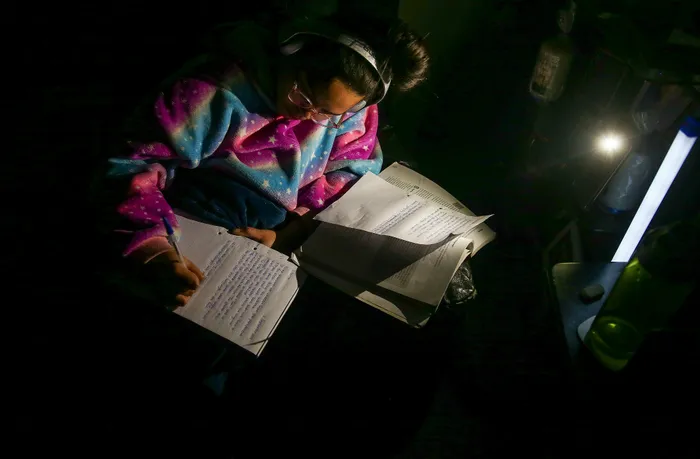Eskom hints at keeping the lights on for longer in summer

Grade 11 pupil Skyla Evans using a cell phone torch and a rechargeable light doing her homework during stage 6 loadshedding. Picture Leon Lestrade. African News Agency/ANA.
Eskom has hinted that while there will be load shedding in the warmer months, residents can look forward to lower levels of load shedding towards and end of 2023 and early next year.
"The current projections, which are informed by previous summers’ performance and the generation recovery initiatives instil confidence that the current summer outlook is realistic," said Eskom's group executive for transmission, Segomoco Scheppers.
He was part of a panel that provided an update on the performance of the power system as well as feedback on the implementation of the Generation Operational Recovery Plan and outlook for the country's summer period - September 1, 2023 - March 31, 2024.
Scheppers explained that the summer outlook forecasts three unplanned losses scenarios of 14 500MW, 16 000MW and 17 500MW.
"The unplanned loss of 14 500MW being the most likely scenario with anticipated 116 days of load shedding at stages not exceeding Stage 4. The second scenario projects a loss of 16 000MW, resulting in 187 days of load shedding, mostly at Stage 5 and at Stage 6 for 29 days. The third is the projected loss of 17 500MW with 211 days of load shedding, 30 of them at Stage 7.
“Eskom is working tirelessly to contain load shedding as low as possible, with the aim of not exceeding Stage 4 by maintaining unplanned load losses within the 14 500MW scenario," he said.
Meanwhile, giving an overview, Eskom’s acting group chief executive, Calib Cassim, took cognisance of the impact that the rolling blackouts have had on the country's economy and residents.
He said the power utility is aiming to keeping load shedding as low as possible, with the hopes of not exceeding Stage 4 for the remainder of the year.
Cassim said as the country moves towards the warmer season, Eskom was able to contain the intensity of load shedding below levels that were anticipated in the country's winter outlook.
"Although we still had to implement Stage 6 for 39 days out of a total of 153 days due to higher-than-expected levels of unplanned outages, we were also able to suspend load shedding during the day in the June month, limiting it only to the afternoon through the evening peak until midnight, thereby lessening the impact. However, we concede that much still needs to be done," he said.
IOL
Related Topics: